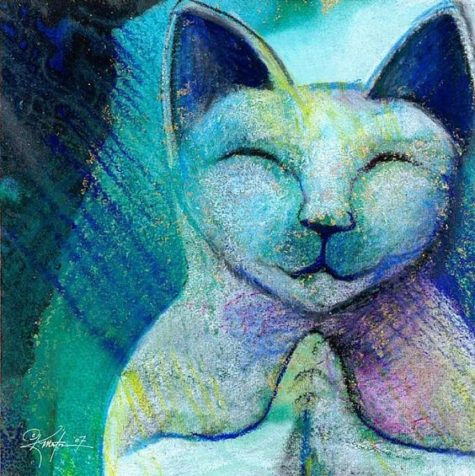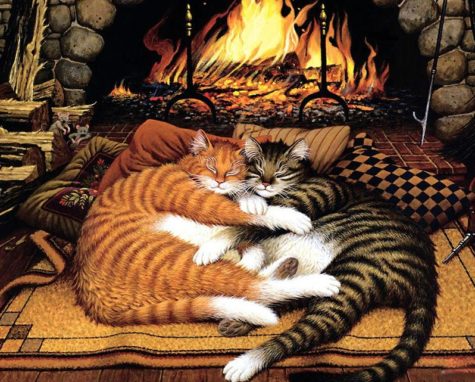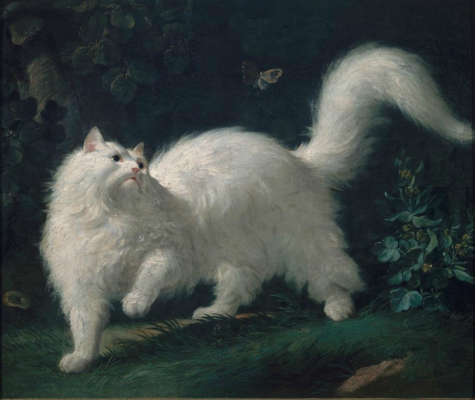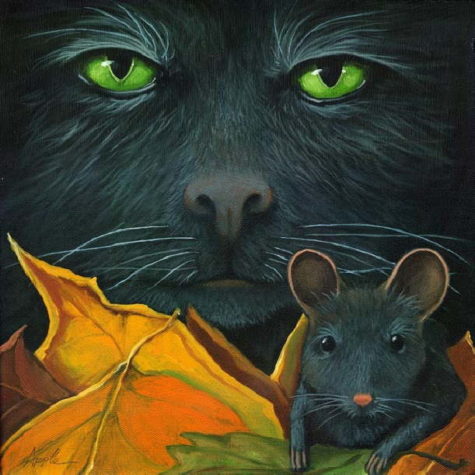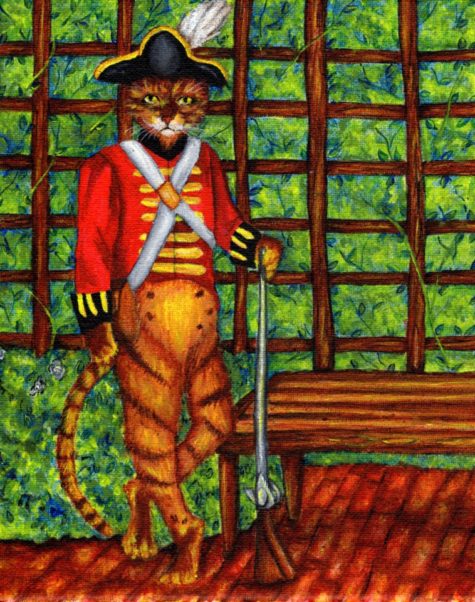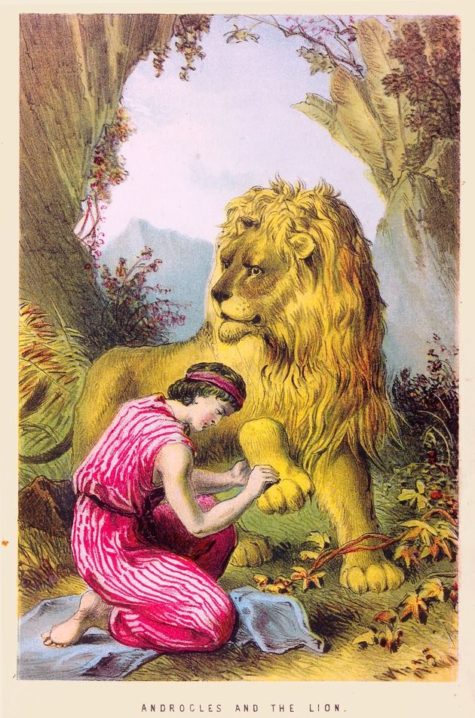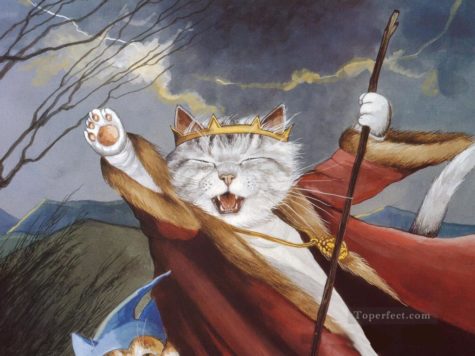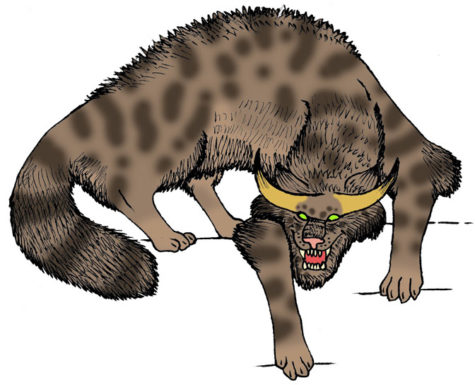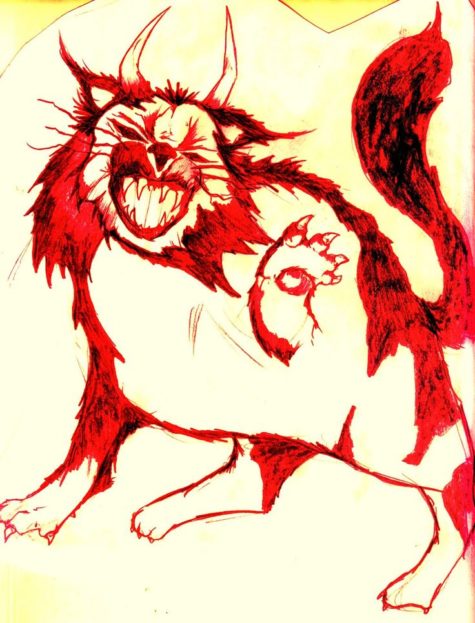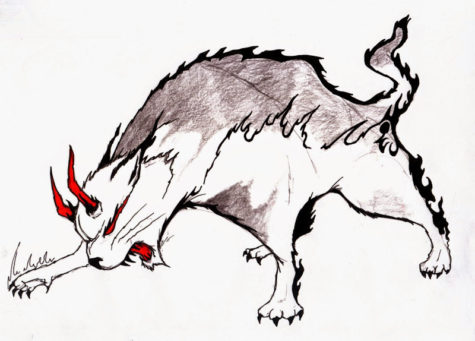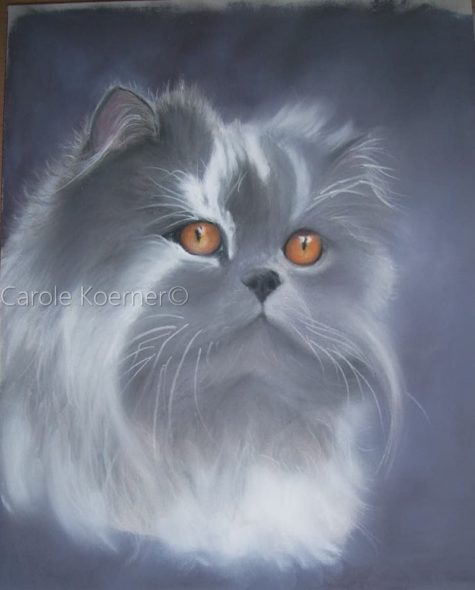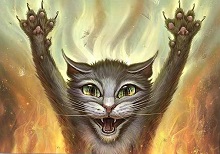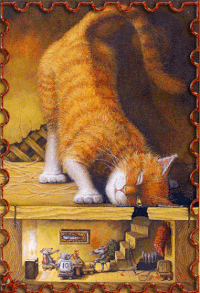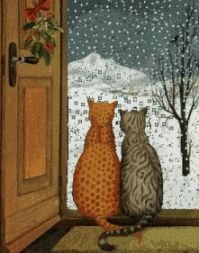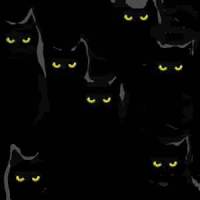Stories
The Famous Patripatan
In India, the cat is recognized as a magical bringer of luck and there is the legend of the famous Patripatan.
This cat was so cunning and so softly insidious that when he once climbed into the land of Devendiren in the sky (where, as we all know, there reigned twenty-four million gods and forty-eight million goddesses) in order to plead his master’s cause, he became the friend of the all-powerful king of the gods and the beloved confidant of the most beautiful of the goddesses.
He did so much and so well that for three hundred years he forgot to come down again to the earth.
And while the prince and the inhabitants of the kingdom of Salangham awaited his return, not a person aged by a single hour during all the hours and days and years that passed. At last Patripatan returned. In his white paws he brought a complete and heavy branch of that rarest talisman-flower of Parasidam, in full flower. And from that day there was nothing but gentleness and beauty in that kingdom.
Found at: Moggycats Cat Pages
The Kitten and the Hungry Fox
This story is from a less kind and gentle time when foxes in farmyards were about as welcome as rats and robbers, and so the ending to the story was much more entertaining (and less horrifying) than it is now, when most of us think foxes are just as cute as kittens.
One night, a hungry fox came upon a kitten in a farmyard and decided that the kitten was exactly the right size for a meal.
“Please don’t eat me,” begged the kitten, “If you spare me, I’ll show you where the farmer hides his big rounds of cheese and you’ll get a much better meal than my poor skin and bones!”
The hungry fox agreed to spare the kitten and the kitten led the hungry fox to the farmer’s well.
“Look down there,” said the kitten, “That’s where the farmer hides his cheese. Look how big it is! There’s enough there for us to share if only you will fetch it, for I’m far too small to go down on my own.”
The fox looked down and saw, at the bottom of the well, a huge white creaming round of cheese. He began to drool in hunger and wanted the cheese all for himself, for not only was he hungry, he was also greedy and not of a mind to share the prize with the kitten. However, he made a play of being willing to share the cheese.
“But how can I reach it you tricksy little kitten?” the fox asked, “You have shown me the cheese, but not how to get to it!”
“If you sit in the bucket, I can lower you down to the cheese,” replied the kitten, “Then I can pull you and the cheese up and we can share the prize.”
“How do I know you won’t just leave me down there?” asked the suspicious fox, “We will both go down in the bucket, and both climb up with the cheese. That way I know you can’t trick me.”
So the fox and the kitten both went down the well in the bucket. As soon as the bucket hit the water, the great creamy round of cheese disappeared! The fox then realised that he had been tricked and that what he had taken to be cheese had been the moon’s reflection on the still surface of the water. Angrily, the fox turned to the kitten, determined to eat the trickster, but he was too late. As soon as the bucket had hit the water, the kitten had sped up the rope to freedom. The much heavier fox tried to climb the rope but succeeded only in pulling the rest of the rope into the well. Thus the kitten was saved and the hungry fox was drowned.
Found at Moggycats Cat Pages
The Cat in the Fireplace
Once upon a time there lived a man and his wife in an old cottage. The couple rarely had enough money for comforts and sometimes not even enough money for bread or for wood for the fire. Their only companion was a black tomcat with great golden eyes.
One evening, in the cold winter, the couple watched their small fire burn out. They had no more wood to put on the fire as the weather was too bad for them to venture out to collect fallen branches. So they sat huddled in blankets, lamenting their bad luck and poor station in life, by the ashes until the ashes had grown cold and the couple had fallen into despair.
Then the woman noticed two embers still glowing and flickering at the back of the fire. Though they had no wood with which to kindle a fire, the cheerily glowing embers made them feel warmer and less sad and they began to talk of happier things. Late into the night they talked of happier times and began to be more optimistic about the future. But eventually, even the two glowing coals seemed to be burning out.
“I’ll blow them into life,” said the man and he blew gently into the fireplace.
With a great screech, their black tomcat shot up out of the fireplace and up the chimney. The glowing, flickering embers had not been embers after all, but had been the cat’s eyes glowing and blinking back at the couple as they talked. As the cat had begun to fall asleep the embers had seemed to die.
The man and his wife had been kept warm through the night by their own optimism and realized that their greatest possessions were not wealth and objects, but each other and their cat.
Found at: Moggycats Cat Pages
The Cat of la Croix des Haies
One evening, the good Pichard was returning from Haute-Chapelle, near the pond of Bain, where he had been courting his betrothed. At the foot of the cross in the square called la Croix des Haies he saw a beautiful big white cat. She miaowed tenderly, and crossed over to rub herself against his legs. From that day, every evening and at that same spot he would meet this lovesick cat. So it went on until he was married to Nanon, his fiancée.
Months passed and Pichard forgot his encounters with the white cat. Then, one night, he awoke with a start to discover he was alone in bed. His beautiful Nanon was nowhere to be seen. Pichard found this very strange. Stranger still, in the early hours of dawn, just as he was opening his eyes, his wife quietly slipped into the bed. Pichard questioned her, but though he became annoyed, threatened her and finally sulked, she did not say where she had been, except to say she was a faithful wife to him.
Though Pichard sulked and glowered, that evening he lay down beside her and all seemed normal. Suddenly, at midnight, Pichard woke to find Nanon was again gone, but the great white cat from la Croix des Haies was purring beside him in the room. Still sulking, he went back to sleep and in the morning his wife was beside him again.
Night after night the same thing happened. Pichard wondered how his wife got out since the door was firmly bolted. Fascinated, he set himself to watch. Though he fell asleep before his wife left, he managed to wake up nearer dawn and kept himself awake to wait for her return.
To his surprise, he saw a small white paw slipping through the doorway to reach the bolt. Softly Pichard rose, and struck the intruding paw with a thunderous blow of his hatchet, chopping it clean off. A horrible scream came from the other side of the door.
For eight days Nanon did not appear. Eventually she returned, her head low, her face flushed with confusion. She passed her husband, went straight to her bed without a word and wept. Pichard saw that her hand had been chopped off at the wrist.
Found at: Moggycats Cat Pages
The Cat and The Rat
The cat has always and everywhere been the rat’s enemy, and according to Madagascan legend it was the rat who started it.
Once upon a time the cat and the rat lived in peace. One day, however, a great famine overtook them. There was nothing to eat, so they set off for a more fertile country. On the journey they came to the banks of a river too wide for them to swim across. Finding no driftwood to use as a raft, they dug up an enormous yam. The rat set to and hollowed it out with his teeth, making a canoe.
When the boat was ready they embarked, the cat paddling and the rat navigating from the stern. But the rat, having been born with an eternal hunger, soon began to eat the edges of the yam. The cat knew nothing of this until the canoe shipped water and began to sink. Then, too late, he realized that the rat had foolishly put both their lives in danger. He meditated on revenge. In the water the rat, weak with hunger and fatigue and about to drown, begged the cat for help.
“I will only help you,” said the cat, “if you agree to let me eat you when we reach land.”
Always having a trick in reserve, the cunning rat consented. When they reached the bank the rat said to the cat, “Wait till I am dry. While I am saturated you will not find me good to eat.” The cat believed him, and the rat used the delay to dig out a hole among some tree roots and hide. “Now I am dry,” he cried.
In vain the cat struggled, digging furiously, but the rat was safely out of reach deep in the earth. And so it was that the rat escaped and that the entire race of cats, duped, declared eternal war on the entire race of rats.
Found at: Moggycats Cat Pages
The Reincarnated Cat
Here is a true story of a cat, reputed to be the reincarnation of General Sir Thomas Edward Gordon, 1906. British Officer.
For twenty-five years an oral addition to the written standing orders of the native guard at Government House near Poona had been communicated regularly from one guard to another on relief, to the effect that any cat passing out of the front door after dark was to be regarded as His Excellency, the Governor, and to be saluted accordingly. The meaning of this was that Sir Robert Grant, Governor of Bombay, had died there in 1838 and on the evening of the day of his death a cat was seen to leave the house by the front door and walk up and down a particular path, as it had been the Governor’s habit to do after sunset.
A Hindu sentry had observed this, and he mentioned it to others of his faith, who made it a subject of superstitious conjecture, the result being that one of the priestly class explained the mystery of the dogma of the transmigration of the soul from one body to another, and interpreted the circumstance to mean that the spirit of the deceased Governor had entered into one of the house pets.
It was difficult to fix on a particular one, and it was therefore decided that every cat passing out of the main entrance after dark was to be treated with due respect and the proper honours. The decision was accepted without question by all the native attendants and others belonging to Government House. The whole guard, from sepoy to sibadar, fully acquiesced to it, and an oral addition was made to the standing orders that the sentry at the front door “present arms to any cat passing out there after dark.”
Found at: Moggycats Cat Pages
Androcles and the Lion
This is the story of Androclus according to Apion. Apion was a 1st century AD. Greek grammarian and commentator who claimed to be an eyewitness to events. The tale has also been told as “Andy Rockles and the Lion.”
One day in Rome the people were being entertained by the fighting of several strange beasts, and principally of lions of an unusual size. Amongst the lions, there was one who stood out from the rest through his furious deportment, his size and strength and his loud and dreadful roaring. Amongst the other slaves being made to fight the lions was one called Androclus of Dacia. Androclus, belonged to a Roman lord from the consulate.
On seeing Androclus, the huge lion suddenly stopped, as if wondering what to do. It then softly approached the slave in a gentle and peaceable manner, as if to greet him. The lion then began to wag his tail, like a friendly dog, and nuzzled and licked the hands and thighs of the poor slave who was almost dead with fear. Recovering his composure, Androclus appeared to recognize the lion and caressed it to great applause from the spectators. The emperor demanded to know the cause of so strange an event and called the slave to him.
Androclus explained that his master, the proconsul in Africa, was cruel and beat him daily. Androclus had run away and, afraid to take refuge in towns, had hidden in a sandy, uninhabited area, resolving to kill himself if he could not support himself. During the heat of noon, he sheltered in an almost inaccessible cave.
Soon afterwards, a lion entered the cave with one foot wounded and bloody, complaining and groaning with pain. Androclus had been terrified, but the lion had spotted him and approached gently, displaying its wounded paw as if asking for help. Androclus drew out a great splinter and, growing a little more familiar with the lion, squeezed dirt and gravel out of the wound then wiped and cleansed it.
Now much more comfortable, the lion fell asleep with its paw still in Androclus’ hand. From then on, the slave and the lion lived together in the cave for three whole years, eating the flesh of the beast that the lion killed. The lion allowed Androclus the best pieces, which the slave roasted in the sun.
Androclus eventually grew tired of his wild and brutish life. While the lion was hunting, Androclus escapred from the cave and, three days later, was taken by Roman soldiers. The soldiers returned him to the proconsul who condemned me to die in combat with wild beasts. It seemed that the lion was also captured and had recognised and greeted Androclus in the arena.
That was the story that Androclus told the emperor and which was retold to the people. Androclus was absolved from his sentence and set free. The lion was, by order of the people, presented to him. The people later saw Androclus leading this lion, in nothing but a small leash, from tavern to tavern at Rome, and receiving what money everybody would give him, the lion being so gentle, as to allow itself to be covered with the flowers that the people threw on it.
The King of Cats ~ A British Tale
This is an old British tale about the King of Cats. It’s somewhat different from the Irish story of the King of Cats, which can be found here.
Once upon a time, a man had a calf to sell and decided to go to the November fair in Macroom. He borrowed a horse and cart from a neighbour and was to set off for the fair at about one o’clock in the morning to be sure of arriving nice an early and getting a good price. At one o’clock, he got up and looked outside. The night was too black to see anything, so he stirred the fire into life and put on a kettle for a cup of tea while he harnessed the horse.
There was a heavy mist coming down and the man was wet through by the time he had harnessed the horse and was ready for a hot cup of tea. He thought it was a foolish thing to be doing – going out on a cold, wet night to travel twenty miles in the dark, with only the lanterns on the sides of his cart to show him the way. Still, it had to be done, so he put on a thick coat and set off. The horse was just as unwilling to travel on that cold, wet night and would far rather be sleeping in its stable. Barely and hour had passed and both man and horse were wet through and miserable.
As they drew nearer to the town, the man could see the lights in the farms by the roadside, where the people were getting up for the fair – people who lived close enough to Macroom that they did not have to travel in the middle of the night. Soon there was quite a procession of people on the road with calves and cattle being driven to the fair. It was still dark and the daylight was only just coming.
The man took his place in the fair, and no one made him an offer for the calf for a long time. A few made offers of poor prices and other farmers told him that the prices were low anyway. In the end, cold and dejected and tired from lack of sleep, he accepted an offer, though the price was not a good one, rather than be left to take the calf home again which would have meant a wasted journey.
Cold, wet and hungry, he made a few purchases and then met with some friends for some bread, cheese and ale before they all set off for their homes. He was not looking forward to the long journey home, but at least a full stomach and a quaff of ale raised his spirits a little.
He let the horse go at her own pace and though the rain came down again, the man fell asleep wrapped in his greatcoat and huddled on the driver’s seat of the cart. Dozing fitfully, he barely heard the other travelers passing him, but he began to have strange dreams that could scarcely be told from reality.
As he was passing the graveyard of Inchigeela, a cat put his head through the railings and said to the man, “Tell Balgeary that Balgury is dead.” The man paid little heed to that, for he was too tired to know if it was real or just the product of his exhaustion. At last he arrived home and settled the horse in the stable with hay and water and went into the house to change out of his wet clothes.
His wife immediately began to ask about the fair – how many were there, whether he got a good price for the calf and whether he had heard any news while in town. After replying to questions, the farmer told her to be quiet a while and fetch him some tea to warm him through.
His wife fetched the tea and asked again if there was any news from town – people that had died, babies that had been born, people that had moved into or out of the area and people that had married since last time the farmer had been to town. Her husband told her he had been too wet and tired to stand around gossiping at the fair.
“Fancy going in all that way and hearing nothing at all,” complained his wife, “And not getting a good price for the calf either. You might as well have stayed at home for all the good that you get out of a fair.”
Finally, the man remembered the strange thing at Inchigeela and said “The only news, if you can call it that and not a dream, was when I was passing the graveyard of Inchigeela. A cat stuck his head out of the railings and said ‘tell Balgeary that Balguny is dead’.”
At that, their cat, sitting before the fine, jumped up and glared at the man. “The Devil fire you!” said the cat, “why didn’t you tell me before? I’ll be late for the funeral. It does no good for the heir to be late.”
And with that, the cat leapt through the cracked open window and was gone like the wind. From that day on, the farmer and his wife saw no sign of him.
Horned Demon Cat
Found in Cats of Magic, Mythology, and Mystery, this is reputed to be a true story of the Horned Demon Cat of World War II.
It could have been a scene enacted from Dante’s ‘Inferno’ – even the clouds seemed to be wreathed in flames as torrent after torrent of plummeting German bombs screamed through the darkened skies over south London, and danced a fiery tarantella of death upon its shuddering streets, like a flurry of shrieking souls in everlasting torment. And in the midst of this panorama of pandemonium was Howard Leland – one of many volunteers with the ARP (Air Raid Precautions) who had been boldly defying the deadly rain of missiles throughout that fearful evening in October 1943 in a desperate bid to minimize its malevolent effects. Little did Leland realize, however, that he would soon encounter something infinitely more sinister, and malign, than anything conjured forth by the wartime enemy.
As the ground reverberated from the intensity of yet another mighty explosion nearby, Leland ran into a deserted house to take shelter, until the immediate danger had passed. The building’s interior was pitch-black, but with the aid of his torch he located a staircase, and rested on the bottom step for a while, waiting for this latest airborne assault to end.
Suddenly, a cold shadow of fear swept across him, for as he sat there he realised – indefinably but undeniably – that he was no longer alone in that house. Something – not someone – else was here too, close by, and watching him. Unbidden, his eyes gazed upwards, to the top of the stairs, and the feeling intensified. Surely there, concealed amid the stygian gloom, was the source of his fear – and now he would reveal its identity.
Leland switched on his torch again, directing its penetrating beam onto the topmost stair – and beheld a hellish sight that transfixed him with fear, expelling from his mind all of that evening’s previous horrors in an instant. Crouched upon the stair was a huge hairy beast with tabby-like stripes of black and brown, clawed paws, and blazing eyes like glowed like twin infernos, mesmerizing Leland with their incandescent gaze. It would have resembled a monstrous cat – had it not been for the pair of sharp pointed horns that protruded from its skull!
For almost a minute, Leland remained motionless, held in thrall by the cold aura of palpable evil that radiated inexorably from the beast’s unblinking eyes – and then it moved! With a single colossal leap, it sprang from the stair, plunging down into the shadowy room – but before it reached the ground, it had vanished. Yet its presence had not entirely gone – for Leland could plainly hear a spine-chilling yowling cry, echoing in the empty room.
At that same instant, however, the sound of human footsteps came from the open front door – and the spell was broken. The eldritch cries ceased immediately, and through the door walked two of Leland’s ARP comrades. Their reassuringly familiar forms and voices swiftly dispersed the shroud of terror that had encompassed Leland only moments before, and encouraged him to recount his chilling experience. Neither of his friends had heard anything when entering the house, however, so he did not expect them to treat his account seriously – which is why he was so surprised when they listened silently and with grave expressions throughout his story, making no attempt to scoff or scorn his words.
When Leland had finished, his friends informed him that he was not the first person to have spied the feline monster. On the contrary, it had been seen by many different eyewitnesses over a period of several years, and the sightings were always the same – an immense horned cat with demonic eyes, squatting at the top of the stairs.
Nevertheless, in the hope that a more straightforward explanation may be forthcoming, the three men walked up the stairs and searched everywhere thoroughly for any physical evidence of the creature’s reality, but nothing was found.
Still disturbed by the memory of this grotesque entity but anxious to uncover its identity and possible significance, two days later Leland visited a renowned clairvoyant, John Pendragon, and recalled to him his encounter. After listening intently, Pendragon located the house on a large map of London, then placed a forefinger on the precise spot marking it.
At once, Pendragon’s mind was filled with a whirling vista of cats – countless furry wraiths swirling all around at the top of the deserted house’s stairs in a screeching, spitting vortex of feline fury, a mad maelstrom of undying hate. And at its very centre was something much larger, but it was not a cat – not even a horned demon cat. It was a man – haggard and despairing, with a noose in his hand, about to place it around his own neck.
After describing this vision to Leland, Pendragon asked him to make enquiries among the house’s neighbours, to discover whether any details of its history and of its previous owners corresponded with those in his vision. A week later, Leland returned, bearing some extremely interesting (and vindicating) news.
One of the house’s former inhabitants had been an ardent practitioner of the black arts, in the vain hope of improving what he had perceived to be a wretched, unfulfilled life. In accordance with one particularly grisly ritual, he had routinely slaughtered numerous cats for sacrifice upon an unholy altar. Ultimately, the balance of his mind had become totally unhinged, and he had committed suicide – hanging himself with a noose, suspended from the banister at the top of the stairs. Shortly afterwards, the great horned cat was seen there for the first time, and spectral yowling cries have often been heard since too.
Was the horned demon cat an elemental?
When Leland asked his opinion as to this monster’s precise nature, Pendragon suggested that it was probably an elemental spirit – one whose feline appearance and vitriolic hatred had been created by the restless ghosts of the departed sorcerer’s many feline victims, and which would linger indefinitely in the grim locality where they had all met their terrible deaths.
Although the vast majority of Britain’s mystery cats are unquestionably exotic non-native cats that have escaped or have been deliberately released from captivity, or are simple misidentifications of common animals, some investigators have speculated whether a few of them may in reality be paranormal (zooform) entities ‘disguised’ as big cats – as would certainly seem to have been the case with London’s horned demon cat of World War Two.
Incidentally, it should be noted here that although the original source of this case was John Pendragon’s autobiography, Pendragon (1968), which was written in collaboration with paranormal mysteries writer-investigator Brad Steiger, it only contained a fairly brief account of events. However, Steiger’s own book, Bizarre Cats (1993), included a much more detailed, greatly expanded version as related to him by Pendragon, which not only emphasized the entity’s feline nature but also incorporated other noteworthy additional information – such as the full name of the eyewitness (merely referred to by his initials in Pendragon’s book), and the hideous cat-slaying rituals performed by the man who had subsequently committed suicide in the house where the horned demon cat was later seen.
Where The Persian Cat Came From
Once upon a time there was a great Persian hero called Rustem, who was a brave fighter and did many great deeds. One night, Rustem saved a magician from some robbers who had set upon the man suddenly in a lonely place. It being too dark for the magician to return to his own home, Rustem invited the old man to spend the night in his tent and to dine with him.
After supper Rustem and the magician sat outside the tent in the cool air and watched a big fire which Rustem’s retainers had lit to keep out the night-time chill. It was a clear, starlit night and a quick little breeze fluttered the smoke of the fire so that it danced and whirled about above the flames. The stars seemed to dance with the smoke, glittering and gleaming between the shapes and eddies. Here and there a little tongue of darting flame joined in the dance too.
After a while the magician spoke to Rustem. “I should like to make you a gift in return for what you have done for me. Tell me what beautiful thing you most desire and I will make it so.”
However Rustem was a man of deeds who had no great desire for material things. “There is nothing that I desire,” he said, “when I look around me there is more than enough beauty for me to enjoy. At the moment, what could be more beautiful than that smoke and the fire and the stars?”
“In that case, I will make a gift for you out of the smoke and the flame and the stars,” said the magician.
Rustem watched in awe as the magician took a handful of smoke and a flame of fire and two bright stars and kneaded them together for a minute.
At last the magician sat back and opened his hands and said, “Rustem, here is my gift to you.”
Rustem was delighted, for the magician had made a little live creature with long, soft, smoke-grey fur and bright, star-like eyes and with a little red tongue like a tiny flame of fire. The creature danced and capered about, and was a joy to look upon.
“Take it home,” said the magician. “It will be a companion for your children and an ornament for your house.”
Rustem took the kitten home with him and it brought great joy to his household. And that was how the first Persian kitten came into the world.
Found at: Moggycats Cat Pages
